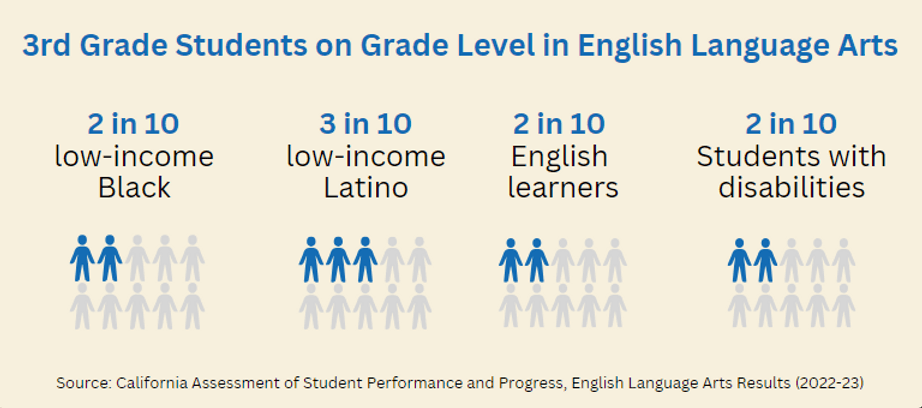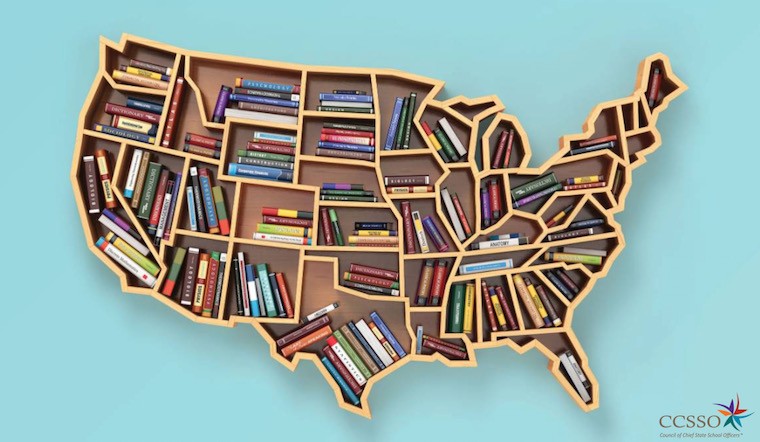Legislation still needed to close California’s reading gap

California’s reading crisis
Nearly three out of ten adults in California can’t read well. It’s one of the lowest literacy rates in the nation, and it matters. Adults who struggle to read have a tough time in life. They are more at risk of living in poverty, less likely to find a job, more socially isolated, and less likely to live healthy lives.

Lori DePole
The case for legislation in 2024-2025
We depend on education to ensure that the adults of the future will be in a better position — but will they? More than half of California’s children aren't reading at grade level by the time they finish third grade. They don't have the skills they need for success in school.
Many struggling readers are from lower-income communities, especially if they are Black, Latino, English learners (ELs), or have disabilities. Nearly 70% of these students struggle with reading. Kids who aren’t reading proficiently by the end of third grade are 4 times less likely to graduate from high school and 8 times less likely if they also live in poverty.

The problem is not the kids
What’s behind these disturbing statistics? It’s not the kids. It’s the failure of California schools to adopt educational approaches that are known to be effective.
We need to replace outdated instructional materials, invest in quality reading interventions, and improve instruction for educators about how to teach reading. We need to halt the damaging loop of illiteracy by providing evidence-based reading instruction early in a child’s schooling. Closing the reading gap early can set our children on the path to success.
If we could help everyone in California learn to read better, the economic benefit would be massive.
What needs to change?
Replace outdated teaching materials. It's been almost ten years since California last updated its list of instructional materials for English Language Arts/English Language (K-8).
Invest in quality reading interventions. Surprisingly, there are no state-approved reading intervention materials to help young kids in grades K-3 become better readers, even though research shows that helping them early makes a big difference. Some school districts are using materials based on literacy instructional practices that are outdated, ineffective, and sometimes harmful. Today, too many teachers and students are not provided with evidence-based instructional materials that adhere to the science of reading.
Improve teaching. The problem is not just about having better materials; it's also about making sure we provide better support for our teachers by training them in effective, evidence-based ways to teach reading. Unfortunately, according to research by the National Center for Teacher Quality (NCTQ), many teacher prep programs are using outdated approaches or materials, especially in California.
With the right kind of reading instruction, almost all kids — over 90% of them — can become good readers. The right kind of instruction takes research into account.
The Science of Reading: A Path Forward
Decades of scientific research have revealed a great deal about how reading skills develop. Unlike walking or talking, learning to read doesn’t happen naturally— it has to be taught. This body of knowledge from the fields of neuroscience, cognitive psychology, education and others is referred to as the science of reading.
The research is clear about how children learn to read and why some students have difficulty. It describes the importance of additional language support for California’s 1.1 million English Learners, who are learning to read while also learning English. Research also has helped identify common reading instructional practices (like prompting) that are not supported by research. We know how to solve this problem to better help kids learn to read.
Unfortunately, change can be hard.
Nationwide changes in how literacy is taught.
In recent years, more than a third of states have passed comprehensive legislation to follow the science of reading. There are encouraging signs of success.
For example, Mississippi, one of the leaders in early literacy reform, went from being ranked 49th in the country in 2013 for fourth grade reading to 21st in 2022. The state has made steady progress in reading scores for Black and Latino students and students from low-income communities. California, by contrast, hasn’t sustained the same progress. It is time for California to pass early literacy legislation that recognizes the diversity of the young children in our state.
Low-income 4th grade students in Mississippi consistently outscore those in California in reading. In 2022 just 25% of Mississippi’s low-income fourth graders scored at a level rated at least proficient for their grade level. In California the scores were even worse — only 18% did so. Source: Nation’s Report Card (NAEP).
Legislation to improve reading blocked in 2024
In our September 2, 2022 post “Too many students can’t read”, we listed >seven key recommendations to help all students reach the goal of literacy by third grade by 2026. California has made some progress toward our recommendations by passing K-2 universal screening for reading difficulties and new literacy teaching standards for schools of education, but it has fallen short of comprehensive literacy reform.
Specifically, California schools need to replace outdated instruction, invest in better curriculum, and better teach educators how to teach reading. Assembly Bill 2222 (2024) by Assemblywoman Blanca Rubio proposed to close these gaps. With bipartisan support from 13 co-authors, the bill was co-sponsored by Decoding Dyslexia CA, EdVoice, and Families In Schools. But it was blocked without a hearing.
Listen to a podcast about this legislation on EdSource:
The bill in 2024 (AB 2222) would have:
- Required instructional materials to follow the science of reading for English Language Arts (ELA) and English Language Development (ELD).
- Made sure that teachers in elementary school get support and training so they understand evidence-based ways to teach reading, including in meeting the unique needs and assets of California’s English learners.
- Checked that teacher training programs are doing a good job so that new teachers are ready to teach kids how to read when they enter the classroom.
- Recognized that early literacy instruction aligned with the science of reading is also critical for students who are English learners but that they will need extra support to bolster their oral language as they learn to read and write in a new language.
Important legislative changes often require a few tries to iron out areas that need clarity — in this case, reassurance about the implications for bilingual students. While the process in 2024 was disappointing, it is not the end of the road.
Closing Thoughts
Literacy is a civil right.
Literacy is a fundamental civil right and should be handled with the same urgency as any other social justice issue. With instruction that follows the science of reading, almost all kids–well over 90% of them – can become good readers. It is essential for California's legislative leaders to take action on literacy and implement substantive reform.
Learn more about this important legislation at >CaliforniaKidsRead.org.
Tags on this post
English learners Learning Reading Teachers Certification EdSource PedagogyAll Tags
A-G requirements Absences Accountability Accreditation Achievement gap Administrators After school Algebra API Arts Assessment At-risk students Attendance Beacon links Bilingual education Bonds Brain Brown Act Budgets Bullying Burbank Business Career Carol Dweck Categorical funds Catholic schools Certification CHAMP Change Character Education Chart Charter schools Civics Class size CMOs Collective bargaining College Common core Community schools Contest Continuous Improvement Cost of education Counselors Creativity Crossword CSBA CTA Dashboard Data Dialogue District boundaries Districts Diversity Drawing DREAM Act Dyslexia EACH Early childhood Economic growth EdPrezi EdSource EdTech Education foundations Effort Election English learners Equity ESSA Ethnic studies Ethnic studies Evaluation rubric Expanded Learning Facilities Fake News Federal Federal policy Funding Gifted Graduation rates Grit Health Help Wanted History Home schools Homeless students Homework Hours of opportunity Humanities Independence Day Indignation Infrastructure Initiatives International Jargon Khan Academy Kindergarten LCAP LCFF Leaderboard Leadership Learning Litigation Lobbyists Local control Local funding Local governance Lottery Magnet schools Map Math Media Mental Health Mindfulness Mindset Myth Myths NAEP National comparisons NCLB Nutrition Pandemic Parcel taxes Parent Engagement Parent Leader Guide Parents peanut butter Pedagogy Pensions personalized Philanthropy PISA Planning Policy Politics population Poverty Preschool Prezi Private schools Prize Project-based learning Prop 13 Prop 98 Property taxes PTA Purpose of education puzzle Quality Race Rating Schools Reading Recruiting teachers Reform Religious education Religious schools Research Retaining teachers Rigor School board School choice School Climate School Closures Science Serrano vs Priest Sex Ed Site Map Sleep Social-emotional learning Song Special ed Spending SPSA Standards Strike STRS Student motivation Student voice Success Suicide Summer Superintendent Suspensions Talent Teacher pay Teacher shortage Teachers Technology Technology in education Template Test scores Tests Time in school Time on task Trump Undocumented Unions Universal education Vaccination Values Vaping Video Volunteering Volunteers Vote Vouchers Winners Year in ReviewSharing is caring!
Password Reset
Search all lesson and blog content here.
Login with Email
We will send your Login Link to your email
address. Click on the link and you will be
logged into Ed100. No more passwords to
remember!















Questions & Comments
To comment or reply, please sign in .
Jeff Camp - Founder April 13, 2024 at 7:16 pm